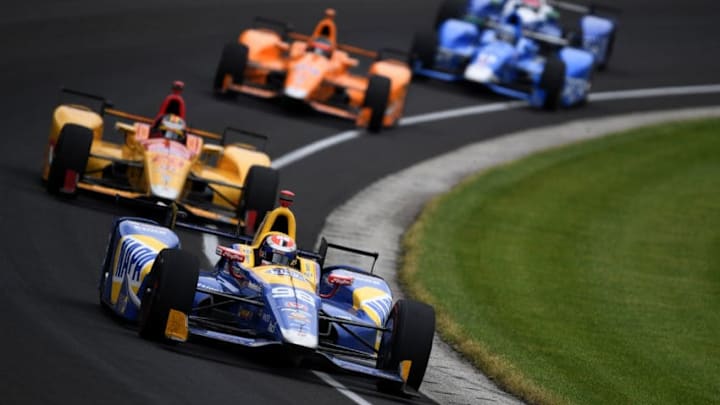Since returning to IndyCar in the 2012 season, Chevrolet has been the dominant engine manufacturer. But in the 2018 season, there will be no excuse if Honda underperforms.
Since returning to IndyCar in the 2012 season, Chevrolet teams and drivers have been tough to stop to the point where they have been dominant over the Honda teams and drivers.
In the 101 races that have taken place since Chevrolet made their return to IndyCar as an engine manufacturer, Chevrolet drivers have won 67 races, while Honda drivers have won just 34 races.
Chevrolet drivers have never won fewer than 10 races in a season, while Honda drivers have never won more than nine. Chevrolet drivers have won as many as 14 races in a season, while Honda drivers have won as few as two.
Here is a chart of win totals for Chevrolet drivers and Honda drivers since Chevrolet returned to the sport as an engine manufacturer in the 2012 season to join Honda.
| Chevrolet | Honda | |
| 2012 | 11 | 4 |
| 2013 | 10 | 9 |
| 2014 | 12 | 6 |
| 2015 | 10 | 6 |
| 2016 | 14 | 2 |
| 2017 | 10 | 7 |
But in the 2018 season, there are really no excuses for Honda should they fail to perform as a high level.
Their major disadvantage, at least from the 2015 to the 2017 season, was their aero kit. With Chevrolet and Honda both allowed to develop their own aero kits for their cars, Chevrolet clearly had the upper hand.
However, in the 2017 season, Honda drivers still managed to win seven of the 17 races, thus showing that despite their disadvantage in the aerodynamic department, they made up for it in the horsepower department.
This has been made especially clear given their recent success at the superspeedways, particularly Indianapolis Motor Speedway. Now with a universal aero kit set to be used by all Chevrolet and Honda teams in the sport, Honda should technically be at an advantage since they have had better power in recent years.
Plus, five of the top six teams in the sport are Honda teams. The only Chevrolet team in the top six is Team Penske, and they have scaled down to a three-car full-time operation as opposed to a four-car full-time operation like they have been in each of the last three seasons.
More from IndyCar
- IndyCar: Two teams with no drivers confirmed for 2024
- IndyCar: Chip Ganassi Racing news hints Alex Palou announcement
- IndyCar: ‘Addition by subtraction’ could pay off in a big way
- Team Penske should make a bold driver signing for 2024
- IndyCar: 5 teams that still have open seats for 2024
Seeing as how they accounted for all 10 of Chevrolet’s wins in the 2017 season when Chevrolet still had a big aerodynamic advantage, Honda should really be considered the favorite to lead the two engine manufacturers in victories this season for the first time since Chevrolet returned to the sport in 2012.
Andretti Autosport, the sport’s lone four-car full-time team, are a Honda-powered team. Chip Ganassi Racing, the team that have won six of the last 10 IndyCar championships, are a two-car full-time Honda-powered team. In fact, in each of their last three seasons as a two-car full-time team, which were the 2008, 2009 and 2010 seasons, one of their two drivers won the championship, and neither of their drivers finished lower than 4th place in the standings.
Rahal Letterman Lanigan Racing have been strong as a one-car full-time Honda-powered team in the last three years, so they should thrive as a two-car full-time team in 2018. Honda-powered teams Schmidt Peterson Motorsports and Dale Coyne Racing have also had recent success, as they both won one race apiece in the 2017 season.
Next: Top 10 IndyCar drivers of all-time
How will the battle between Chevrolet and Honda teams and drivers unfold in the 2018 IndyCar season? Will Chevrolet dominate again, or will Honda take over? The season is set to get underway with the Grand Prix of St. Petersburg on Sunday, March 11th.
